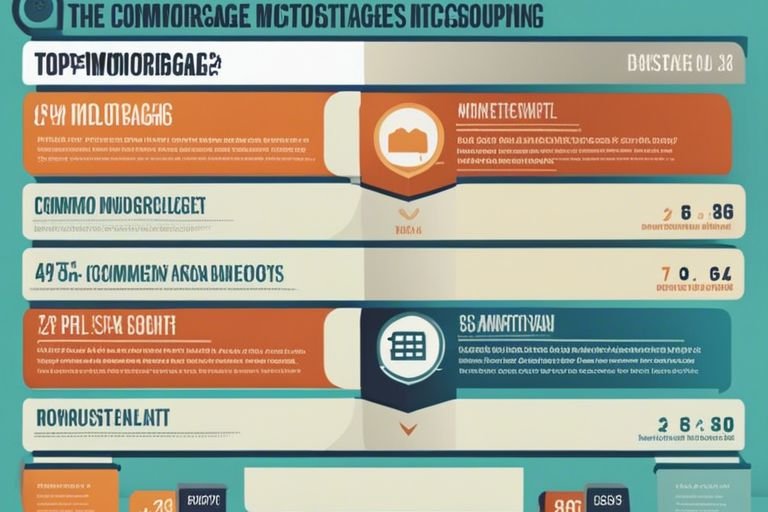Over the years, many misconceptions have circulated about mortgages, causing confusion and misunderstanding among potential homebuyers. In this top 10 listicle, we aim to debunk five common myths surrounding mortgages, shedding light on the truth behind these widely-held beliefs.
Key Takeaways:
- Down payment: Contrary to popular belief, you don’t always need a 20% down payment to buy a home. There are various loan programs available that require less than 20% down, making homeownership more attainable.
- Credit score requirements: While a good credit score is important when applying for a mortgage, there are loan options for individuals with lower credit scores. It’s important to explore different options and consult with a lender to find the right mortgage for your situation.
- Interest rates: Fixed-rate mortgages provide stability as the interest rate remains the same throughout the loan term. On the other hand, adjustable-rate mortgages with fluctuating interest rates can be a viable option for some borrowers depending on their financial goals and circumstances.
Only 20% Down Payment
Lesser Down Payment Options
Now, you don’t necessarily need to come up with a full 20% as a down payment to secure a mortgage. Many lenders offer programs that allow for much lower down payments, such as 5% or 10%, making homeownership more achievable for a wider range of individuals and families. These options can be particularly beneficial for first-time homebuyers who may not have substantial savings.

Perfect Credit Required
Any individual looking to purchase a home or refinance their current mortgage might mistakenly believe that a perfect credit score is necessary to qualify for a loan. However, this is not entirely true. While a good credit score can definitely help secure a favorable interest rate, it is not the only factor lenders consider when evaluating a borrower’s creditworthiness.
Acceptable Lower Scores
If you have a credit score that is less than perfect, don’t fret. Many lenders are willing to work with borrowers who have lower credit scores. While it may be more challenging to qualify for a loan with a lower score, it is not impossible. Lenders may require additional documentation or offer slightly higher interest rates, but there are still options available for individuals with acceptable lower scores.
Alternative Lending Solutions
Assuming you have less than stellar credit, there are alternative lending solutions available in the market. These solutions may include government-backed loans like FHA loans, VA loans, or USDA loans which have less stringent credit requirements. Additionally, some lenders offer specialized programs for first-time homebuyers or individuals with lower credit scores. It’s important to explore these alternative lending solutions to find the best option that fits your financial situation.
Scores of less than perfect credit should not completely deter you from pursuing a mortgage. With the right financial planning, a realistic perspective, and awareness of alternative lending solutions, it’s possible to find a mortgage that suits your needs and helps you achieve your homeownership goals.
Fixed-Rate Mortgages Always Best
To many homebuyers, fixed-rate mortgages may seem like the safest option when it comes to home financing. The idea of having a consistent monthly payment that won’t fluctuate with the market can provide a sense of security and predictability. While fixed-rate mortgages are indeed a great choice for many, they may not always be the best option for everyone.
Adjustable Rates Benefits
Even though fixed-rate mortgages are popular, adjustable-rate mortgages also have their own set of advantages. These types of mortgages often come with lower initial interest rates, which means lower initial monthly payments. In a rising rate environment, adjustable-rate mortgages could potentially save you money over the long term.
Personal Financial Circumstance
Any decision regarding a mortgage should be based on your personal financial circumstance. Factors such as how long you plan to stay in the home, your ability to handle potential payment fluctuations, and your overall financial goals should all play a role in determining the type of mortgage that is best for you.
Rates and terms are just one piece of the puzzle when it comes to mortgages. Understanding your own financial situation and considering factors beyond just the interest rate can help you make the best decision for your long-term financial well-being.
5 Common Misconceptions About Mortgages Debunked
Associated Costs Consideration
Always ensure you consider all the associated costs when refinancing your mortgage. While refinancing can potentially save you money in the long run, it’s crucial to account for closing costs, application fees, appraisal fees, and other expenses. These costs can add up and may impact the overall savings you expect to achieve.
Long-Term Financial Impact
One common misconception about refinancing is that it always saves money in the long term. While refinancing can lower your monthly payments or interest rates, it’s important to consider the long-term financial impact. Extending the loan term or consolidating debts through refinancing may result in paying more interest over time. It is crucial to weigh the pros and cons before making a decision.
Financially, it’s important to evaluate how refinancing fits into your long-term financial goals. Consider how refinancing may impact your overall financial health, such as your ability to save for retirement or other financial goals. Consulting with a financial advisor can provide you with a comprehensive understanding of the potential benefits and drawbacks of refinancing.

Self-Employment Limits Approval
Despite the common misconception that being self-employed makes it more challenging to get approved for a mortgage, it is entirely possible to secure a home loan while working for yourself. While the process may have its unique challenges, with the right preparation and documentation, self-employed individuals can successfully obtain a mortgage.
Income Verification Methods
Limits in income verification methods for self-employed individuals can include providing tax returns, profit and loss statements, and bank statements to demonstrate a stable income. Lenders may require additional paperwork to verify the consistency and reliability of income for self-employed borrowers.
Non-Conventional Loan Products
Verification of income and finances for self-employed individuals can be more flexible with non-conventional loan products such as bank statement loans or stated income loans. These loan products consider alternate methods of income verification beyond traditional employment records, making them a good option for self-employed individuals.
Any self-employed individuals looking to secure a mortgage should consult with a knowledgeable lender specializing in loans for self-employed borrowers. By understanding the unique requirements and options available, self-employed individuals can navigate the mortgage approval process successfully and achieve their homeownership dreams.
Summing up
Drawing together the key points, we have successfully debunked five common misconceptions about mortgages. Do not forget, understanding your mortgage options is necessary for making informed decisions. Don’t be afraid to ask questions and seek guidance from professionals to ensure you find the best mortgage solution for your needs.
